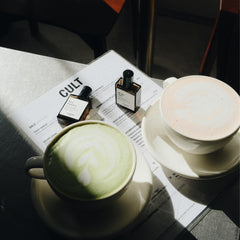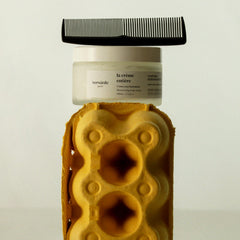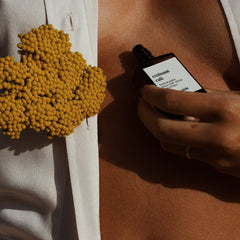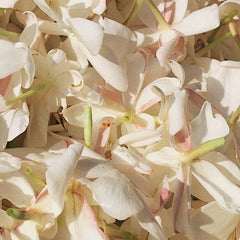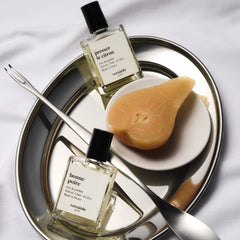
What is a nose? Part of our face yes and?
To be a nose is in fact, to be a perfumer.
It was in 1651 that Louis XIV issued the patent and the recognition of the status "Master glover-perfumer" (at the time, leather was perfumed, hence this alloy).
Anyway, back to 2021.
Because this job is a little-known job in the eyes of consumers, because our perfumers practice a job in the shadows (place for the brand, the packaging, the muse but... without the juice in your perfume, it missing something right?)
We interviewed our 4 perfumers at Flair, in order to better explain this profession, its facets, its advantages and its specificities.
- What is the training to become a perfumer?
There are many different paths: with or without a school, passing through an internal school at a composition house or not, being self-taught etc... At Flair, two training courses meet. Amélie and Anne-Sophie made their range at Cinquième Sens and learned from a master perfumer. Transmission is the key to their learning. As for Camille and Elia, they both completed the Ecole Supérieure du Parfum, a 5-year course combining chemistry, olfaction, creation, marketing, etc., one of the specialties of which is the creation of perfume.
- What is the difference between a large composition house (such as Givaudan, Firmenich, Symrise) and an independent laboratory?
In the big composition houses, there are many intermediaries (evaluators, salespeople, marketing, etc.) who participate in the perfume creation process, everyone has a role. In independent perfumers, there may or may not be evaluators. At Flair, we are 4 perfumers, there are no intermediaries. There is often a privileged relationship between customers and perfumers. The creation is made to measure, the process is very responsive and fast and finally the quantities offered in production are often adapted to the needs of smaller brands.
- What is the difference between appraiser and perfumer?
It's not the same job at all.
- The perfumer has the know-how of the composition, he assembles the raw materials and brings them to life together. He is at the genesis of creation.
- The evaluator is an intermediary between the perfumer, the customers and the sales representatives, who will translate the customer's desires and guide the perfumer's creation. He is someone who knows the market by heart. It therefore has a very important role within the composition houses, between coordination, strategy and olfactory expertise. He has a look at the finished essay and can thus have a certain perspective on the creation.
- How to know if such or such material will agree with another?
It is a very long apprenticeship, based on experiments and trials. We follow our olfactory intuition by imagining what this or that pairing will give. We compose. Then the formula is weighed in the laboratory. We feel it, we learn. And we start again. Over the years and many tests, we begin to know the materials and their reactions with each other. But the combinations are endless, we always have inspiration and the desire to try new things!
- Why are women perfumers less promoted than men? Nose is it a men's job?
Like many other professions, the profession of perfumer has long remained the prerogative of men. It changes with the generations. There are more and more women within the composition houses or at the head of the creation of certain major brands (Christine Nagel at Hermès, Mathilde Laurent at Cartier). School students are also mostly women. If the media are still struggling to dwell on the profiles and creations of female perfumers, this will eventually change (we hope!). The trend is going in the right direction and would require even more inclusiveness.
- What is the concept of Flair?
Our creation studio aims to create new agreements to offer original perfumes. We do everything to be as reactive as possible in order to make a client's project concrete and real.
- The big composition houses often create the ingredients themselves. As a freelancer, how do you find your raw materials?
We choose the raw materials for our organ in partnership with VO Aromatiques in Grasse, the factory with which we work. The raw materials come from different companies: Biolandes, Firmenich, Robertet, Behave etc….
- Do you know all the raw materials of perfumery by heart?
No, in the laboratory we are already making a selection from the many raw materials that exist in the industry. Those of our palette, we know them very well, but we are constantly rediscovering them, discovering new facets. That's what's exciting about this job, we never stop learning.
- How long (on average) does the creation of perfumes take?
It can range from a few months to a year, a year and a half.
- What is the (average) price you are given to compose?
The average budget that we are given is often around 150€/Kg for a skin fragrance, and 50-80€/Kg for a candle. It can be less or much more depending on the customer's wishes.
- Where are your perfumes made?
VO Aromatique also manages the production of the concentrate, which is done in their factory in Grasse.
- Do you do anything other than perfume?
Yes, candles, olfactory signatures, soaps, shampoos, creams, detergents, etc.
-
What is your favorite part of your job?
It is above all a job of passion so all the aspects, exciting as well as more off-putting, are part of the job as a whole. It is the entire adventure that one chooses when one decides to be an independent perfumer. Afterwards, we all have our preferences, even if it is difficult to choose:
Camille: Managing to convey an emotion through creation
Elia: Contact with raw materials and creation around them
Amelie: Create ( imagine, interpret, transcribe) and exchanges with DAs
Anne-Sophie: The happiness of creating a fragrance that accompanies, reassures, brightens or moves.



